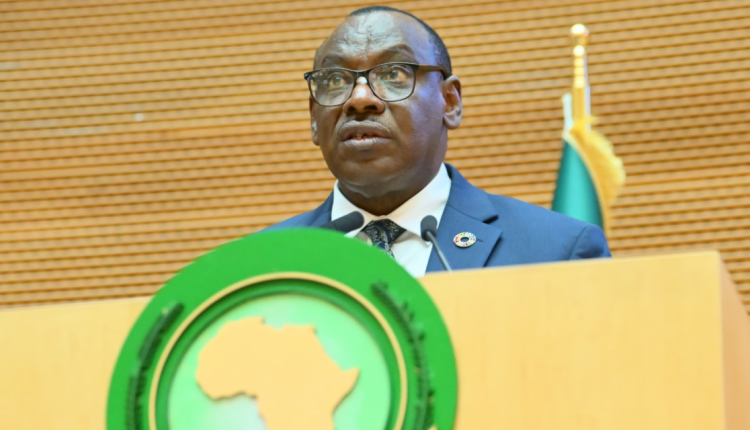ECA Chief Stresses Need for Current Global Financial Architecture Reform to Fit for Purpose
Addis Ababa, February 12, 2025 (FMC) – The Executive Secretary of the United Nations Economic Commission for Africa (ECA), Claver Gatete, praised the African Union and the heads of member states for emphasizing the important theme “Justice for Africans and People of African Descent Through Reparations.”
The 46th Ordinary Session of the Executive Council of the African Union (AU) kicked of today in Addis Ababa under the theme: “Justice for Africans and People of African Descent Through Reparations.” .
During his remarking speech at the opening of session, ECA Executive Secretary stated that the transatlantic slave trade and colonial exploitation robbed Africa of its people, resources and dignity, and left behind inequalities that persist in global financial systems, trade structures and governance institutions, till this day.
The extraction of Africa’s resources without corresponding development, the undervaluation of African economies in global credit assessments, and the systemic barriers to trade and investment are, indeed, contemporary manifestations of these historical injustices, elaborated.
“It is therefore crucial that these, beyond financial compensation, must be addressed as part of our conversation on reparative justice,”
Stating that Africa’s current global financial standing reveals the stark inequalities it faces, Gatete pointed out.
The continent possesses 30 percent of the world’s mineral reserves, including 40 percent of its gold and up to 90 percent of its chromium and platinum. It also contains as much as 65 percent of the world’s arable land.
Yet, Gatete indicated that Africa accounts for less than 3 percent of global trade and only 1 percent of global manufacturing output.
Furthermore, in 2023 for example, intra-African trade stood at just 16 perent compared to intra-European trade at 68 percent.
The Executive secretary said that it is unjust that the entire African continent, with its 54 nations, has an IMF shareholding equal to that of a single country – Germany.
“These disparities are not due to a lack of economic potential but to entrenched structural barriers that keep Africa in a cycle of economic dependency,” he underscored.
The injustice extends to Africa’s credit ratings, which are dominated by external agencies that sometimes apply unfair and subjective assessments to African economies.
“As we speak, only two African countries – Botswana and Mauritius – hold investment-grade ratings, while others, despite sound economic fundamentals, are burdened with high-risk labels.”
Added to these economic disparities is the fact that although Africa contributed the least to climate change, it is suffering the most from its effect. Currently, climate change is costing Africa up to 5 percent of GDP.
“Yet, of the 10 trillion USD invested globally in clean energy between 2015 and 2022, Africa received only 2 percent. This must change. Africa cannot build prosperity on a foundation designed to constrain its growth,” Gatete stressed.
He therefore proposed five key areas to translate this call for justice into tangible outcomes, as called by ENA.
He said the current global financial architecture is outdated, inequitable and unjust and must be reformed to be fit for purpose.
“We must advocate for debt restructuring that allows African nations to invest in their people and development instead of paying exorbitant interest rates.”
According to him, a just world requires governance reforms in international financial institutions to ensure that Africa has a stronger voice in shaping global economic policies.
Also, it is imperative to establish an African-led credit rating agency to ensure fair assessments reflect Africa’s true economic realities rather than outdated risk perceptions, he underscored.

